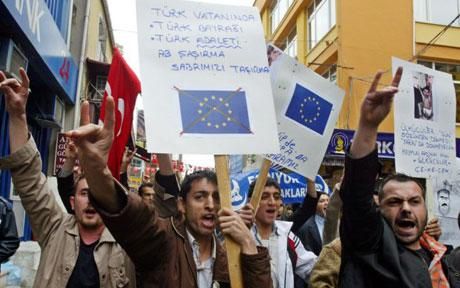THE SUNDAY TELEGRAPH: As Europe's top diplomat prepares to travel to Turkey, Colin Freeman finds a country not entirely convinced about their need to join the EU.

Sipping a lunchtime latte amid the gleaming skyscrapers of Istanbul's financial district, banker Mehmet Canayaz debated whether the European Union should admit Turkey. The prognosis, he admitted, was not good: a dynamic, forward-looking region would end up shackled to an economy with severe debt, financial instability, and an uncompetitive workforce. Best for Turkey, perhaps, to steer clear of the chaotic Brussels club altogether.
"If we don't join, it will be Europe's problem, not ours," said Mr Canayaz, 25, who was relieved to be watching the recent Euro-zone crash from the outside rather than the inside.
"If they do let us in one day, fine. But in coming years, it will be them that needs us, more than us needing them. Their economy isn't as competitive as it once was."
The issue of whether the EU should be allowed to join Turkey, rather than Turkey being allowed to join the EU, is not the way the Eurocrats of Brussels have often chosen to phrase it since the stalled membership talks formally began in 1987.
But when the EU's Foreign Affairs High Representative, Baroness Ashton, arrives in Ankara for fresh accession talks this week, she may well find no shortage of Turks asking the same question the same way round as Mr Canayaz.
Fed up with being rebuffed by France and Germany, proud of their successful economy, and increasingly keen to court their fellow Muslim neighbours to the East, a growing number of Turkey's 73 million citizens are now wondering whether EU membership is quite so important as it once seemed. While nearly three quarters of Turks supported the idea in 2004, some polls less than half doing so now.
Among those whom Baroness Ashton will meet on Tuesday is the man most closely associated with Turkey's re-assessment of its outside interests, foreign minister Ahmet Davutoglu. A key figure in the AKP party, the moderate Islamist movement that has ruled Turkey for the last eight years, he is widely seen as the prime mover in his country's cooling off towards the West. >>> Colin Freeman in Istanbul | Sunday, July 11, 2010